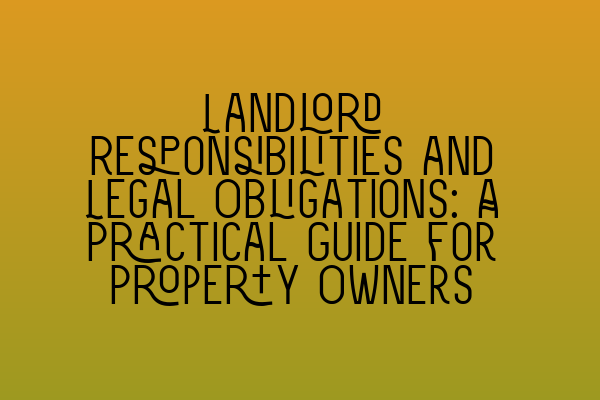Landlord Responsibilities and Legal Obligations: A Practical Guide for Property Owners
As a property owner and landlord, it is essential that you understand your responsibilities and legal obligations towards your tenants. Not only will this help you avoid potential legal disputes, but it will also contribute to maintaining a positive and professional relationship with your tenants. In this practical guide, we will outline some key landlord responsibilities and legal obligations that you need to be aware of.
Renting a Property: Legal Requirements
Before you can legally rent out a property, there are several legal requirements that you must fulfill. These include:
- Obtaining proper licenses: Depending on the location and type of property you own, you may need to obtain certain licenses or permits. It is crucial to research and comply with all relevant licensing requirements in your area. Failure to do so could result in hefty fines or even criminal charges. To ensure you have a comprehensive understanding, check out these SQE 1 Preparation Courses.
- Safety and health regulations: It is your responsibility as a landlord to provide a safe and habitable environment for your tenants. This includes complying with safety and health regulations, such as ensuring the property meets fire safety standards, providing appropriate sanitation facilities, and maintaining electrical and gas safety certificates. Our SQE 2 Preparation Courses can provide further guidance on relevant regulations.
Tenant Rights and Responsibilities
While you have legal obligations as a landlord, your tenants also have rights and responsibilities. Understanding and respecting these rights is crucial for maintaining a harmonious landlord-tenant relationship. Some key tenant rights and responsibilities include:
- The right to a safe and habitable property: It is your responsibility to ensure that the property is free from hazards and maintained in a habitable condition. Regular inspections and prompt repairs are essential to meet this obligation.
- The right to privacy: Tenants have the right to privacy within their rented property. As a landlord, you should provide advance notice and obtain consent before entering the property, except in cases of emergency or when legally allowed.
- Responsibility for rent and utility payments: Tenants are responsible for paying rent and utility bills on time. It is your responsibility as a landlord to clearly outline the payment terms and expectations in the tenancy agreement.
Maintaining the Property
Maintaining the property is an important responsibility that can directly impact your tenant’s satisfaction and well-being. Key considerations include:
- Regular inspections: Conducting regular inspections can help identify maintenance issues early on and address them promptly. It also provides an opportunity to ensure tenants are adhering to the terms of the tenancy agreement.
- Repairs and maintenance: It is your legal obligation to handle repairs and maintenance tasks promptly. This includes fixing plumbing or electrical issues, maintaining heating systems, and addressing structural problems. Failure to address maintenance issues can lead to tenant dissatisfaction and potential legal disputes.
Tenant Screening and Tenancy Agreements
Before entering into a tenancy agreement, it is essential to screen potential tenants thoroughly. This includes verifying their identity, conducting credit checks, and obtaining references from previous landlords or employers. Additionally, it is crucial to have a comprehensive tenancy agreement in place that clearly outlines the rights, responsibilities, and expectations of both parties. Our SQE 1 Practice Exam Questions can help you prepare for related legal topics.
Ending a Tenancy
When the time comes to end a tenancy, there are specific legal procedures that must be followed. These include providing proper notice to the tenant and adhering to any local laws regarding eviction processes. Familiarize yourself with these procedures and seek legal advice if needed to ensure you comply fully.
In conclusion, being a responsible landlord involves understanding and fulfilling your legal obligations towards your tenants. By doing so, you will not only avoid potential legal issues but also maintain a positive and professional landlord-tenant relationship. If you need assistance with any property law matters, consult our team of experts at SQE Property Law & Land Law.
